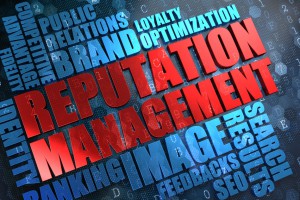
By Deserie Lawrence, Owner & Social Media Marketing Consultant of GetNoticed PR
The consistent management of your brand’s online reputation should be considered an essential component of your business marketing plan. Why, you ask? For several reasons, one being it’s direct effect on your company’s increase in revenue and retention, which I consider pretty important. It’s easy to forget the digital step to the process because for most, we managed our reputation by making sure that our customers were happy when they came through the doors and happy when they left. Or, we would have our service team leave comment cards behind and encourage our customers to send it back or perhaps, call and talk about their experience.
Now, our digital footprint includes reputation management as we see a steady increase each year, currently 2 out of 4 people, using social media to advertise their purchasing decisions. Consumers take the time to inform potential customers on every detail of their experience; from how your establishment looked on first-site, to the quality of product or service they received, they will even leave reviews about their website experience and ease of navigation. That’s right, everything is game and what most alarming, one review generally leads to a snowball effect that we asbusiness owners, need to get in front of.
You know the saying “you have to know where you’ve been to know where you are going? Well, that’s this first step in managing your online reputation; investigative work. Google your company’s name and see what pops up. Then, take it a step further and add phrases such as bad customer service, product isn’t what it seems, etc. The most important takeaway from an online audit isn’t just that your company’s information is correct in all it’s listings but to see what other’s have posted about you across digital platforms. Looking into the negative mentions is a great place to start doing immediate damage control in an attempt to restore faith in the customers that already took a chance on your business and those that are on the fence about it.
Secondly, determine what you want to track. Typically, it’s the meat and potatoes of your business. Name of organization, location, products, tagline, management, website, etc. To take things a step further, setting up alerts to monitor online conversations involving your competitors is a progressive step to staying in-the-know about what they may be doing, good or bad. Mentions about the competition can easily turn into opportunities in leveraging your value proposition if monitored regularly.
The next step will require some planning and discussion with your team. From all the information that you have discovered, create a plan on what type of responses you will need to craft. Service, customer experience, product delivery/quality expectation and unplanned technical issues. Basically, touch points of your business that impacts customers. Your responses should be respectful, not defensive with acknowledgement and information on next steps. Just follow this simple formula; be honest, consistent, accurate and keep all your profiles current.
Now that you’ve completed the process of research and planning, it’s time to start establishing a presence across social media and review sites. As you have already learned, customers take their complaints to the social stage, usually making a stop on a review site or two as well. You’re job is not limited to finding their reviews but also, making sure your business has a concrete presence. I suggest that you pick networks that house both your current and potential customers because speaking to the masses does little to improve your reputation as compared to targeted and identifiable audiences.
From those platforms, you can engage and respond with your customers, educate potential customers and monitor what people are saying about your brand in a digital space. Make sure that you connect your mobile device with all accounts so that you can respond to comments or posts quickly, because as we all learned from our parents, bad news travels ten times quicker than good. Set Google Alerts to monitor mentions about your business and remember, extend those alerts to your competitors as well. Frequently check comments on review sites such as Yelp and Tripadvisor, both are steadily turning into “the source” that people turn to first to find out needed information on location and services and past customer experiences.
There are several ways to monitor and manage your online reputation but the most effective way still remains; provide exceptional customer service and be accountable. The service side starts in your business, the accountability factor starts online. Believe when I tell you, there are plenty more imperative steps to take to protect your brand online reputation, for more information please contact Deserie Lawrence, Owner & Social Media Marketing Consultant of GetNoticed PR (info@gnprsocial.com.)




